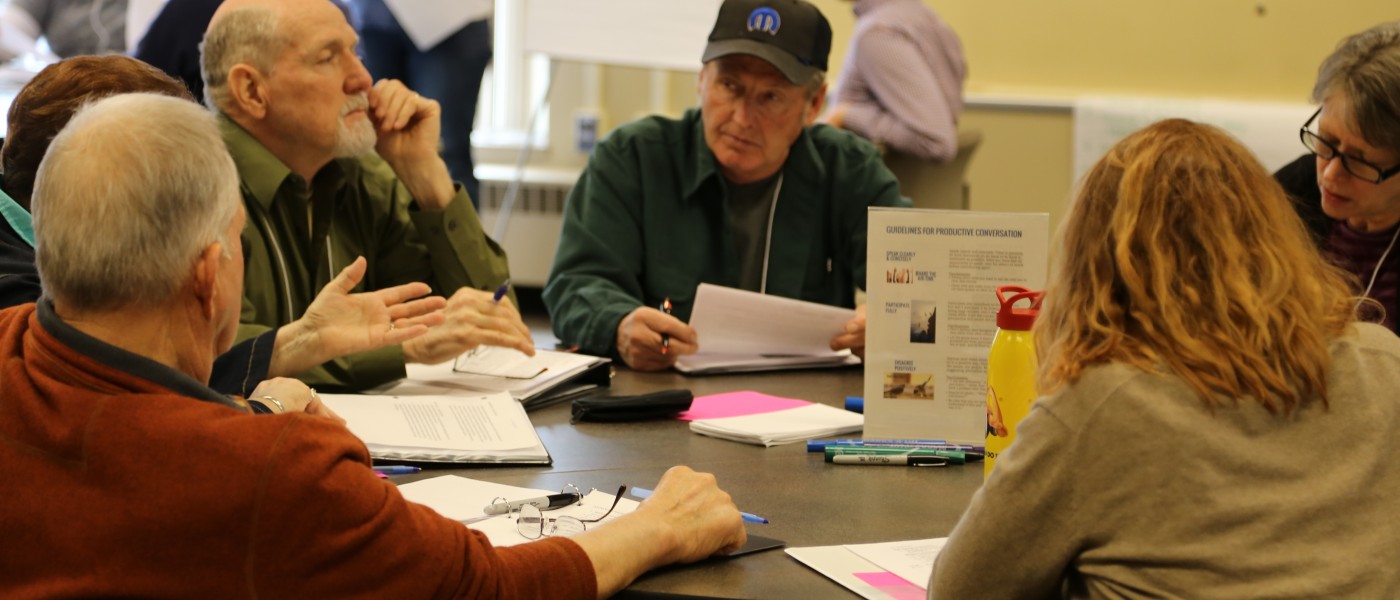Below is a guest post from, Anna Claussen, Director of Rural Strategies at the Institute for Agriculture and Trade Policy, about the Winona, Minnesota, “climate dialogue,” which worked with rural constituents on a path towards rural leadership in climate change.
In early March, farmers and rural residents of southeast Minnesota gathered for three intensive days of presentations, discussion and deliberation around the thorny issue of climate change. The Winona, Minnesota, “climate dialogue” participants were a blend of ages, cultural backgrounds and occupations. Some had lived in the community their whole lives, while others had moved to the area recently. They all loved where they lived and cared about its natural beauty – ideally positioned where fertile farmland meets the deeply carved Mississippi River Valley.
They did not, however, come to the table with any shared view of climate change or political perspective.
There is a common misperception that you can’t talk about climate change in rural communities because the issue is too polarizing. Many would bet that a climate discussion would divide Winona residents and lead to more finger pointing than hand holding. But despite their differences, the 18 participants in the Winona County Climate Dialogue produced a collective statement and action plan, crafted solely from participant input based on six presentations from local experts on weather trends, energy use, water, insurance, public health and agriculture in Winona County.
The failure to effectively engage rural communities on climate change has severely limited America’s ability to address the biggest challenge of our time. We badly need a new approach for rural leadership on climate change.
The Winona plan acknowledges that climate change “will have a real measurable impact on our overall economy, our environment, fish and wildlife habitat, health, insurance rates and more. Individually and as Winona County” they deem that “they needed to take action by working together to prepare for the future.” Better land and runoff management practices were identified as a top need for farmers, who work about 44% of Winona County’s total land area. Support for farmers in adopting new climate resilient practices was identified as a priority action.
Some may ask, what’s the big deal? Given what’s at stake in the face of climate change, for farmers and rural communities in particular, and our broken democracy that’s unable to respond – this is a big deal.
Rural America should be deeply involved in developing future climate policy
America’s rural landscape is comprised of forests, farms and rangelands that can capture carbon when managed appropriately; resources for wind, solar and other renewable installations; and most importantly, people with ingenuity to transition to a low carbon economy. While only 15% of U.S. residents live in rural counties, these counties account for 72% of the nation’s land area, and, by extension, represent most of the nation’s energy production.
Despite this, rural communities are often overlooked in climate conversations, while political debate and policies tend to emphasize urban and suburban perspectives. Too often, we see a failed policy approach that ignores rural community concerns. Proposed strategies like the Clean Power Plan–the first-ever national limit on carbon pollution from power plants–are stand-alone initiatives that don’t improve quality of life, and increase economic inequities and costs for rural citizens. These policies are unattractive for rural residents, who on average earn less, are more food insecure and have higher energy costs than their urban counterparts.
The Growing Divide
There are, of course, real challenges to engaging rural communities on climate policy that run much deeper than climate change. Of all the growing divides in our country, none is sharper than that between urban and rural. The divide is not just geographic, but more imperatively cultural, economic and political, and here in Minnesota the gap is widening. It plays out on both a macro level – between the Heartland of the Midwest and the megacities of the East Coast – and on micro levels – with discordant concerns, demands and needs between county residents and small town dwellers. Urban areas are growing and prominent; rural populations are shrinking and becoming culturally less relevant, even while rural Americans still feed and fuel the nation.
The failure to effectively engage rural communities on climate change has severely limited America’s ability to address the biggest challenge of our time. We badly need a new approach for rural leadership on climate change.
The Rural Climate Dialogues – a Community Solution
While many rural-based climate solutions are already happening, such as the massive expansion of solar and wind energy, biofuels and local food production, many are often avoided because they are climate solutions. First and foremost they need to be community solutions.
For the last year and a half, IATP and the Jefferson Center have organized a series of Rural Climate Dialogues (RCDs), funded in part by Farm Aid. The Dialogues are an effort to identify policy recommendations and direct actions developed through democratic deliberation, high school student contributions, community organizing, and urban-rural technical assistance and advocacy partnerships to address the effects of climate change in rural communities. The RCDs use the innovative and time-tested Citizens Jury method for community problem solving and leadership development.
Each Dialogue gathers a randomly selected but demographically balanced group of citizens for an intense three-day moderated forum on local climate change impacts. In Winona County, that meant half men, half women. Five Democrats, five Republicans, and eight with no party affiliation. Sixteen Caucasian and two people of color. Ten from the city of Winona and eight from the county. Eleven worried about climate change and seven not worried. Ages and education levels were also balanced.
Participants are tasked with creating a community-based response to changing weather conditions and extreme weather events. The conversations are completely citizen-driven; participants have the liberty, information and resources to produce their own recommendations that respond to community needs, priorities, and values.
As the third in a series of RCD’s across the state, the Winona Dialogue confirms a shared concern for more responsible land use broadly, emphasizing the need for greater community support for farmers, who face important challenges as they transition to a more resilient, diverse agricultural system. There was a recognition by all RCD communities to take greater personal responsibility, but also an acknowledgment that some people in the community would be affected more dramatically in the face of changing weather. For example, people on fixed incomes would have to pay a higher percentage toward cooling their homes given rising energy costs, and participants identified that public decision-making needed to take these inequities into account.
Later this year a state convening will bring together the shared concerns, unique needs and the amplified agency among all three Rural Climate Dialogues to engage policymakers, administration and agency staff in an effort to create stronger climate policies in the state, the region and the nation.
Democracy in Action
The dialogue process is far more than an exercise in community decision making; it’s the opportunity to rebuild democracy.
Democracy requires informed citizens. Without pro-rural voices or proposals on the table, climate change deniers have been able to highlight the burdens that new regulation or taxation would bring while ignoring all of the ways in which climate change itself deeply damages rural America, as well as the vast opportunities for rural economic development in a new, clean energy economy.
Climate change can make people feel powerless. People also need to have agency – the feeling and actual power to do something about the problem, not just individually, but as a collective.
Conventional political thinking is that “climate” is too politically charged to discuss in rural America. The reality is that rural citizens are dealing with the challenges of extreme weather directly, and are interested in being part of community and political solutions. Rural opposition to effective climate policy is not inevitable, and can be overcome by genuinely engaging rural residents in climate solutions. Most importantly, all communities, rural and urban, will benefit from supporting rural people and farmers in the transition to clean energy. But in the process we must capitalize on the opportunity to bridge a growing divide between urban and rural, in a manner that deliberately rebuilds democracy.
Visit our Grant Quilt to learn more about IATP's rural and climate-related work with farmers


